Read wordpress search and replace wildcards for more information.
WordPress, the ability to search and filter users efficiently is crucial for website administrators and developers. The default user search functionalities may fall short when it comes to handling specific criteria. This is where the WordPress Search Users by Custom Field plugin proves to be an invaluable tool, allowing you to tailor your search based on custom fields.
Understanding the Importance of Custom Fields:
WordPress custom fields are additional pieces of information that can be associated with your users. These fields provide a flexible way to store and retrieve unique data relevant to your website’s needs. For instance, you might want to include details like user roles, subscription levels, or other custom attributes that are essential for your specific use case.
Installing the WordPress Search Users by Custom Field Plugin:
Before diving into the details of custom field searches, ensure you have the WordPress Search Users by Custom Field plugin installed and activated on your WordPress site. Once activated, you’ll find new options and features added to the user search interface.
Configuring Custom Fields:
Begin by defining the custom fields you want to use for user search. Navigate to the user profile settings, and you’ll notice additional fields where you can input specific information. This step is crucial, as the plugin relies on these custom fields to filter and refine your search results.
Optimizing Search Queries:
With the custom fields set up, it’s time to explore the enhanced search capabilities provided by the plugin. Utilize the search bar on the Users page, and you’ll find new options to filter results based on your custom fields. Experiment with different combinations and operators to create precise queries that match your requirements.
Example Use Cases:
Let’s delve into practical scenarios where the WordPress Search Users by Custom Field plugin shines. Imagine you run a membership site, and you want to identify all users with a specific subscription level. With the custom field search, you can easily retrieve a list of users matching that criterion. Similarly, for an e-commerce site, you might want to find all users who made a purchase within a certain timeframe – the plugin simplifies this process.
Combining Custom Fields for Advanced Queries:
One of the plugin’s strengths lies in its ability to combine multiple custom fields in a single search query. This advanced feature allows you to create complex searches to pinpoint users based on a combination of attributes. Whether it’s filtering by role, subscription status, or any other custom parameter, the plugin empowers you to fine-tune your search precisely.
Troubleshooting and Tips:
As with any WordPress plugin, it’s essential to be aware of potential issues and how to troubleshoot them. Check for compatibility with your WordPress version, ensure that custom fields are correctly configured, and consult the plugin documentation for any specific guidance.
The WordPress Search Users by Custom Field plugin opens up a realm of possibilities for administrators and developers seeking to optimize user management. By harnessing the power of custom fields, you can tailor your user searches to meet the unique demands of your website. Experiment with different scenarios, explore advanced search queries, and unlock the full potential of this plugin to streamline user management on your WordPress site.
Search Replace DB is an extremely good tool meant exclusively for the developers. This makes them run a search real quick. If you want to replace a particular word or an HTML string with another word on WordPress, then you are supposed to go for the search/replace option.
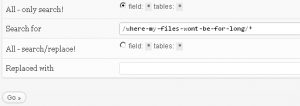
Also, sometimes when you want to remove some code from the database, then WordPress search and replace wildcards show some trouble.
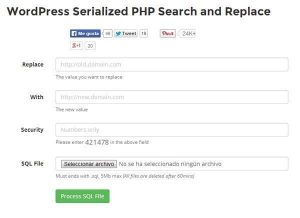
The limited search and replace features in MySQL are not many. This makes the entire process of wildcard changes quite difficult. There is also Search Regex which adds some good search and replaces functions in WordPress. These allow you to search smoothly.
WP-CLI is the command-line interface for WordPress. Using the command-line interface, a developer can update plugins, configure multisite installations and much more, without using a web browser.
One of the more advanced features of WP-CLI is its powerful search and replace function. Search-replace is very handy when changing a site’s URL or other frequently appearing text inside a WordPress database. It can save a vast amount of time over manually updating these values and is much easier than crafting a raw MySQL query to do the same thing.
The usage of the search-replace command is mentioned below and more details of the usage can be found here
usage: wp search-replace <old> <new> [<table>...] [--dry-run] [--network] [--all-tables-with-prefix] [--all-tables] [--export[=<file>]] [--export_insert_size=<rows>] [--skip-columns=<columns>] [--include-columns=<columns>] [--precise] [--recurse-objects] [--verbose] [--regex] [--regex-flags=<regex-flags>]
It’s easy to use wildcards and regex patterns to replace tags or keywords within WordPress. In the example below, all the content within the tags <noindex> is being cleared.
wp search-replace ‘<noindex(.*?)>(.*?)<\/noindex>’ ” –regex wp_posts wp_postmeta wp_terms –regex-flags=’ms’ –dry-run
For all your search needs, alternatively, you can use WP fastest site search plugin from WordPress plugin by Expertrec
- InstallWP fastest site search pluginfrom WordPress plugin store.

- Go tohttps://cse.expertrec.com/newuser?platform=wordpress.
- Enter your WordPress website URL and click on next->

- The crawl will start in the background.

- Login to your WordPress admin panel.
- In your left panel you must be able to see expertrec’s WordPress plugin, click on that.

- Get your site ID (or) API key from your expertrec control panel ( here ).

- Copy paste your site id in your WordPress control panel and click on save changes.

- Make sure you haveupgraded to a paid planbefore 15 days of free trial. (Price begins at 9 USD per month)
- That’s it! Your brand new WordPress search is up and running! Here are snapshots of the search form and the search results pages.
- Snapshot of your WordPress search autocomplete.

- Snapshot of your WordPress search results page.

- Snapshot of your WordPress search spelling error tolerance feature.

The wp search plugin helps you to show search results either in the search overlay mode or on a separate page. The WordPress search widget plugin is based on search results php in Wordpress to search a site. You can also modify the search results order as per your requirements.
Looking for how to add a search box manually in WordPress header. If you are facing any issues with the search you can check WordPress search widget not working. Read more on wordpress search not working how to fix





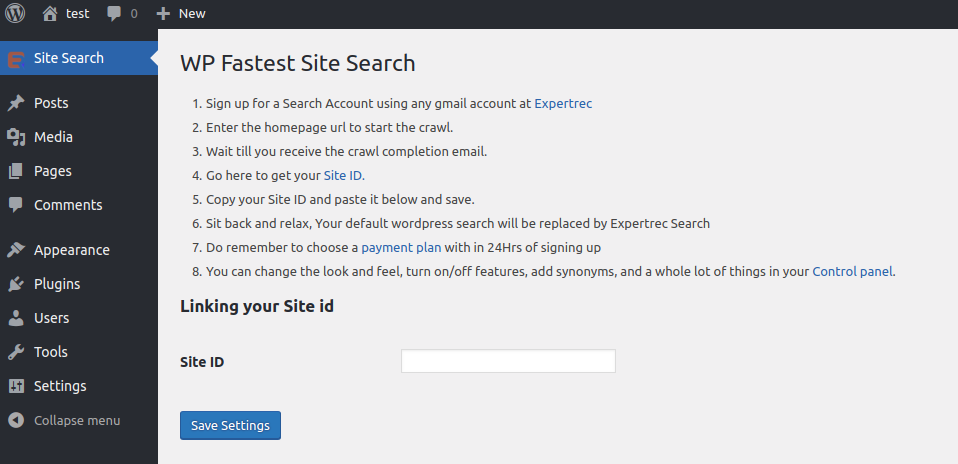
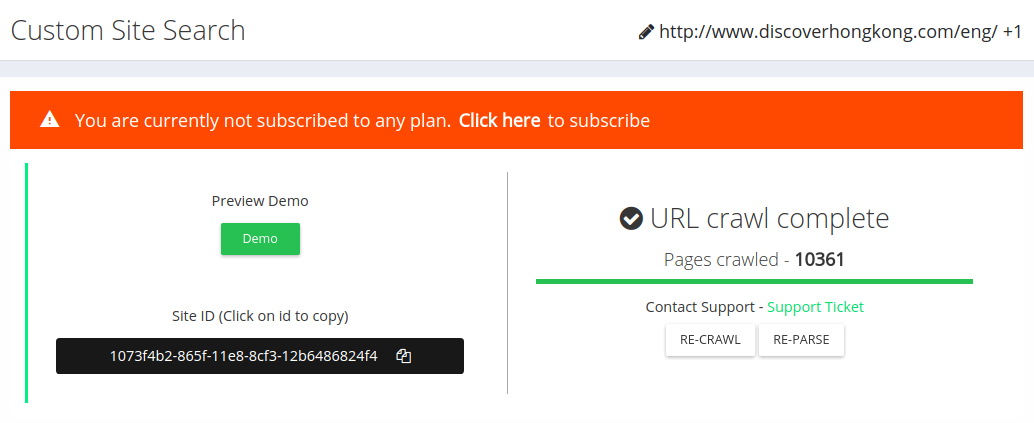
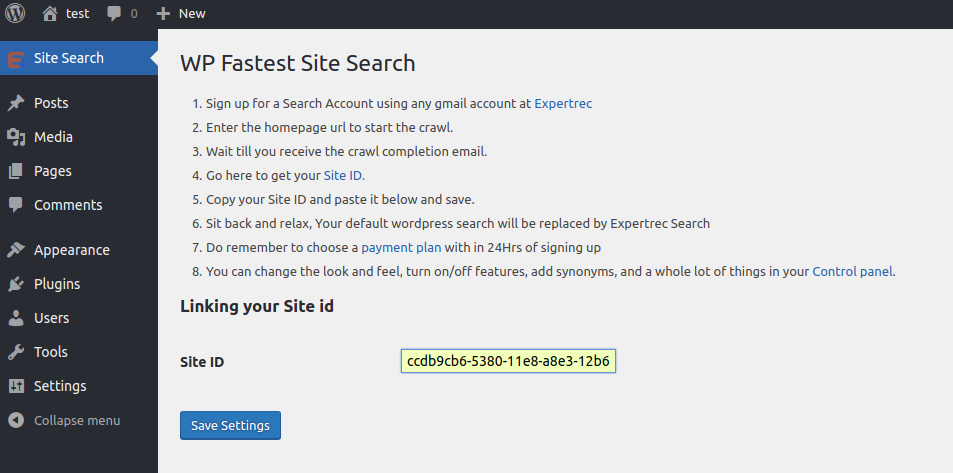





![[WP] | Wordpress live search ajax without plugin](https://blog.expertrec.com/wp-content/uploads/2018/07/forbes-search-demo-1.png)